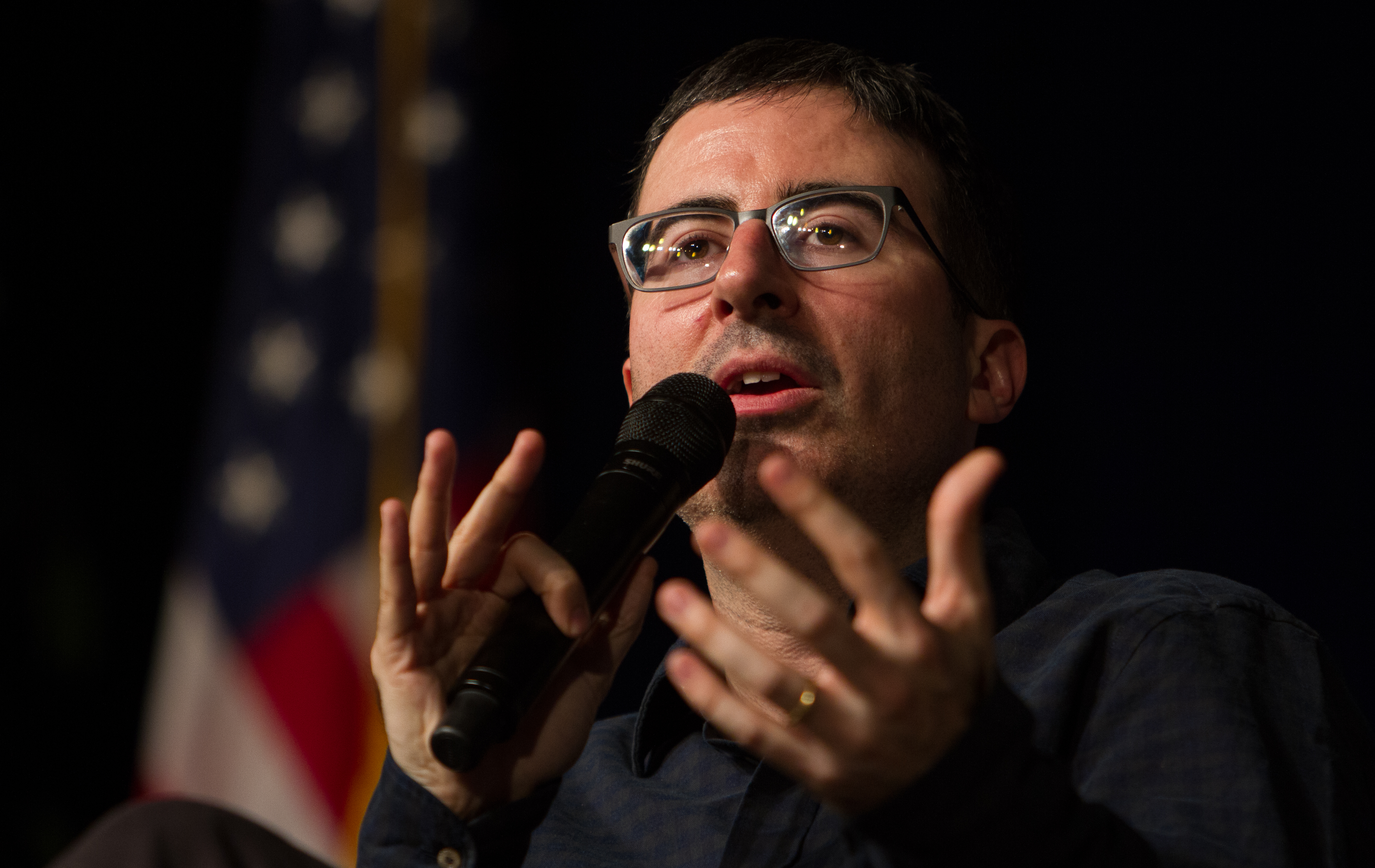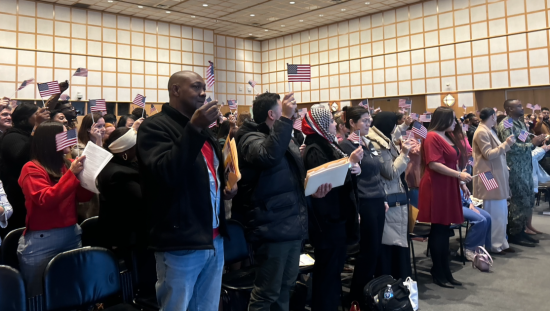An important moment happened on a recent episode of Last Week Tonight With John Oliver.
Let me back up a bit. The first time I saw John Oliver on television playing an obnoxious, possibly alcoholic professor in Community, I hardly thought that a few years later he would have a weekly late night show featuring some of the best political discourse on TV. I certainly couldn’t have imagined the impact he would be having on the world, which Time Magazine has dubbed the “John Oliver Effect.”[1] Essentially, Oliver is raising awareness of otherwise unknown issues, and real change is occurring because of it. Perhaps the most famous example of the Effect came early in the show’s run last year, when Oliver called upon internet trolls to channel their hatred towards the Federal Communications Commission in order to maintain net neutrality. The response was so strong that the FCC’s servers crashed. In February, the Commission approved net neutrality standards. Oliver has also pushed for removing FIFA President Sepp Blatter (he was suspended in October), donating to the Society of Women Engineers instead of watching Miss America (the group raised $25,000 in the two days after the segment aired), relaxing bail requirements (Bill DeBlasio, mayor of New York, announced bail reform in July), and limiting civil forfeiture (the Attorney General’s office pretty much banned the practice in January). It’s difficult to ascertain exactly how much of this is directly attributable to Oliver. But he is getting people to talk, which is how change begins.
Fans of the show know its structure well by now. The British host offers a few quick takes on some ridiculous events of the past week, then transitions to a broad main segment that dives deeply into a problem facing America or the world, often featuring celebrities to emphasize his points. The show is hard-hitting and hilarious. Oliver showcases the real people being hurt by the problem he’s focusing on that week, with various clips from local news shows or documentaries of them explaining their plights. The clips are effective and powerful, and they offer moments of real humanity in segments mired in politics and statistics. But in the episode that aired on November 8th, Oliver changed the very way his show operates.
My original intent with this column was to write about all of the positive impacts that Oliver has had on the political landscape and show how his well-reasoned and researched arguments are changing the debate on important issues. But a couple of weeks ago, Oliver shifted the conversation when he brought ordinary citizen Bilal Chatman in to talk about his difficult experience with the legal system after being released from prison.[2] What was really important in the interview was the focus on Chatman’s otherwise very ordinary life. Oliver took particular interest in Chatman’s love of growing tomatoes, even showing a clip of him working with them as the credits rolled.
It was a very simple moment, and yet it was huge for the show. Oliver often features struggling people in media clips. But this is the first time he’s actually had one of them appear on the show. This is a bigger deal than it might seem for a few reasons. First, it shows who these people really are outside of the clips they’re in. Consider this quote from Chatman:
“I may never do this again. I’ve done other interviews. This takes me back to being that prisoner again. I’m not that prisoner today. I’m a taxpayer. I work. I’m a citizen. I’m a voter. That’s who I want to be. Those are the things that define me today.”
Oliver admits that the show is a bit reductive here, as Chatman is initially defined as the ex-prisoner. But by allowing him to tell his own story, to go deeper into who he really is beyond all of the bad things that have happened to him, Oliver is shifting the narrative toward a better direction. Now, Chatman is the tomato grower who works hard at his job, making it even clearer to the audience why we need to reform post-prison policies.
Oliver is also giving Chatman and other former inmates a huge signal boost. Likely very few people had seen any of Chatman’s previous local TV interviews, and those who did probably didn’t pay much attention. Now, over 2.5 million people have watched the segment on YouTube, and almost 1 million more were watching when it aired.[3][4] While this kind of signal boost happens for every person featured in the clips Oliver uses, it becomes much bigger and more meaningful when the people actually come to the show. I can’t remember the names or stories of most people featured, but I definitely remember Bilal Chatman because he was a significant part of the segment. And when people remember others, they’re more likely to advocate for reforms that would help them.
Finally, as revolutionary as Oliver’s show is, he is still just another straight white guy telling people about the struggles of others. Now, Oliver is well-equipped to do this. He’s a naturally funny, intelligent, and charismatic person, which is what makes him a good host. But when the issues he’s discussing tend to disproportionately hurt underprivileged minorities, having someone who doesn’t belong to these groups proselytizing to others can undercut their stories. Therefore, broadcasting minority voices that can explain what it’s like to be affected by unjust policies is hugely important. These voices can also fight against the white savior mentality by showing that they are leaders of their own movements.
Inviting Chatman on isn’t just revolutionary for Last Week Tonight. It’s revolutionary for television. Oliver’s show has already distanced itself from others like The Daily Show or The Colbert Report by focusing on one issue a week instead of just responding to news stories. Chatman’s interview makes the difference even larger, as those other shows usually interview well-known figures. It also creates a larger divide between Oliver and more standard news shows. National news networks like CNN or FOX News might occasionally interview ordinary citizens, but in the name of being “fair and balanced,” they can’t make as much of a statement as Oliver does. That leaves local news networks, which do often interview citizens like Chatman, but have far less exposure and influence. This places Oliver in a unique position to make a huge impact on the television landscape.
John Oliver is making a big impact on politics. He’s exposing underground issues, providing an alternative to the posturing of politicians, and doing it all while making people laugh. But now, he has an opportunity to start changing how he makes that impact. John, if by some miracle you end up reading this, I urge you to start having more interviews with people like Bilal Chatman. It will make your already fantastic show even more important.
References:
[1] Luckerson, Victor. “How the ‘John Oliver Effect’ Is Having a Real-Life Impact.” Time. July 10, 2015.
[2] Last Week Tonight with John Oliver. HBO. November 8, 2015.
[3] “Last Week Tonight with John Oliver: Prisoner Re-entry (HBO).” YouTube. November 8, 2015.
[4]Metcalf, Mitch. “UPDATED: SHOWBUZZDAILY’s Top 100 Sunday Cable Originals & Network Update: 11.8.2015.” ShowBuzz Daily. November 10, 2015.



